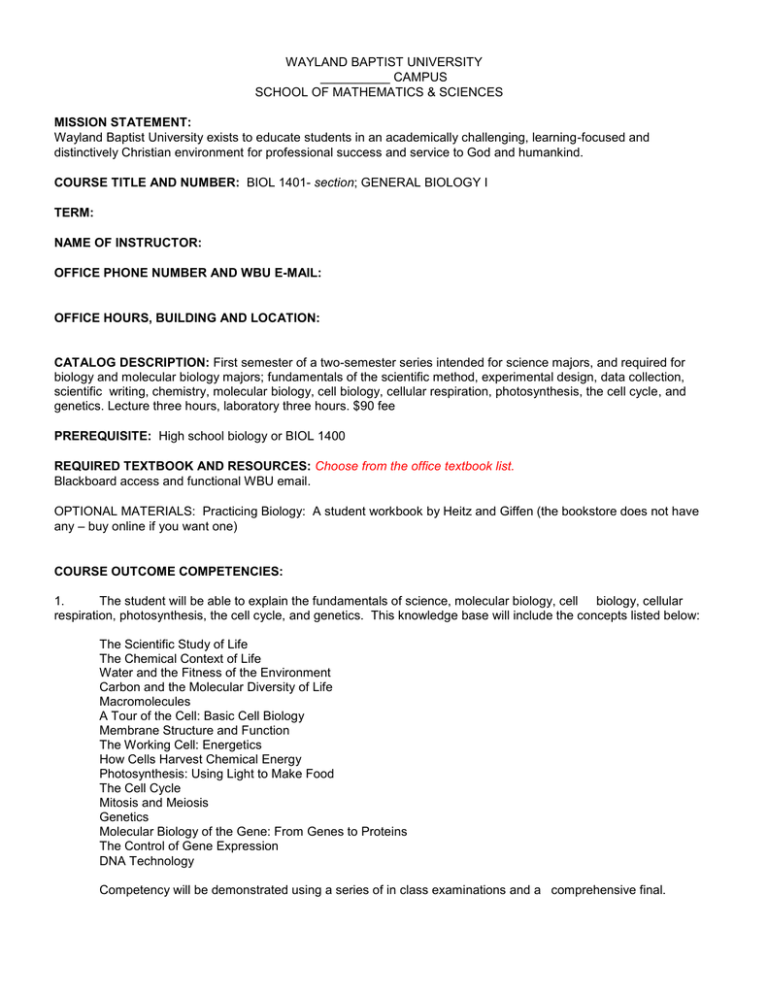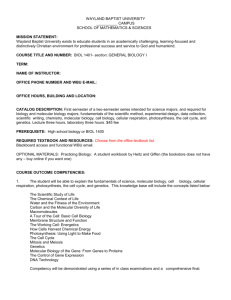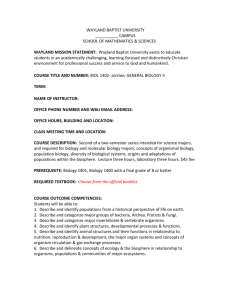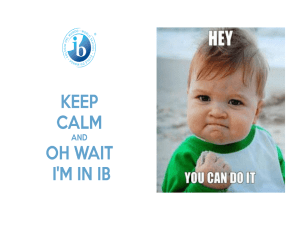WAYLAND BAPTIST UNIVERSITY __________ CAMPUS SCHOOL OF MATHEMATICS & SCIENCES
advertisement

WAYLAND BAPTIST UNIVERSITY __________ CAMPUS SCHOOL OF MATHEMATICS & SCIENCES MISSION STATEMENT: Wayland Baptist University exists to educate students in an academically challenging, learning-focused and distinctively Christian environment for professional success and service to God and humankind. COURSE TITLE AND NUMBER: BIOL 1401- section; GENERAL BIOLOGY I TERM: NAME OF INSTRUCTOR: OFFICE PHONE NUMBER AND WBU E-MAIL: OFFICE HOURS, BUILDING AND LOCATION: CATALOG DESCRIPTION: First semester of a two-semester series intended for science majors, and required for biology and molecular biology majors; fundamentals of the scientific method, experimental design, data collection, scientific writing, chemistry, molecular biology, cell biology, cellular respiration, photosynthesis, the cell cycle, and genetics. Lecture three hours, laboratory three hours. $90 fee PREREQUISITE: High school biology or BIOL 1400 REQUIRED TEXTBOOK AND RESOURCES: Choose from the office textbook list. Blackboard access and functional WBU email. OPTIONAL MATERIALS: Practicing Biology: A student workbook by Heitz and Giffen (the bookstore does not have any – buy online if you want one) COURSE OUTCOME COMPETENCIES: 1. The student will be able to explain the fundamentals of science, molecular biology, cell biology, cellular respiration, photosynthesis, the cell cycle, and genetics. This knowledge base will include the concepts listed below: The Scientific Study of Life The Chemical Context of Life Water and the Fitness of the Environment Carbon and the Molecular Diversity of Life Macromolecules A Tour of the Cell: Basic Cell Biology Membrane Structure and Function The Working Cell: Energetics How Cells Harvest Chemical Energy Photosynthesis: Using Light to Make Food The Cell Cycle Mitosis and Meiosis Genetics Molecular Biology of the Gene: From Genes to Proteins The Control of Gene Expression DNA Technology Competency will be demonstrated using a series of in class examinations and a comprehensive final. 2. The laboratory will provide an opportunity for hands-on exercises which illustrate concepts emphasized in lecture. The student will be able to design controlled experiments, collect and evaluate data, perform basic statistical analysis, and develop scientific writing ability. Competency will be assessed using a series of graded laboratory exercises. 3. Students will use data set experiments to understand the value and limitations of different forms of experimentation including correlation, gain of function and loss of function. Competency will be measured using experimental design exercises incorporated into the lecture and laboratory exams as well as graded laboratory exercises. ATTENDANCE REQUIREMENTS: Students are expected to make class attendance a priority. All absences must be explained to the instructor who will decide whether the work missed may be made up. An absence will be recorded when a student fails to return after an allowed breaktime during the process of an extended session class. Any student who misses 25% of scheduled class meetings may be dropped from the course. No make-up exams shall be given unless arrangements are made in advance of foreseen absences, emergencies excepted. Statement on Plagiarism and Academic Dishonesty: Wayland Baptist University observes a zero tolerance policy regarding academic dishonesty. Per university policy as described in the academic catalog, all cases of academic dishonesty will be reported and second offenses will result in suspension from the university. DISABILITY STATEMENT: In compliance with the Americans with Disabilities Act of 1990 (ADA), it is the policy of Wayland Baptist University that no otherwise qualified person with a disability be excluded from participation in, be denied the benefits of, or be subject to discrimination under any educational program or activity in the university. The Coordinator of Counseling Services serves as the coordinator of students with a disability and should be contacted concerning accommodation requests at (806) 291-3765. Documentation of a disability must accompany any request for accommodations. COURSE REQUIREMENTS AND GRADING CRITERIA: 1. Students are expected to read the textbook assignments and compile a complete set of notes from the text and lecture. 2. Lectures are illustrated with slides, videos and models. Students are encouraged to ask questions and be active participants in the discussions of the material presented. 3. Tests: 3 lecture exams will be given plus an optional comprehensive final. The final will be used to replace the single lowest test grade. If the student scores lower on the comprehensive final than on any of the other exams, it will be the dropped grade and will not count against the student. 4. Laboratory grades include at least 1 formal lab report as well as laboratory practical exams. University Grading System: A = 90 - 100 B = 80 - 89 C = 70 - 79 D = 60 - 69 F = Below 60 I = Incomplete + W = Withdrawal + A grade of incomplete is changed if the deficiency is made up by midterm of the next regular otherwise, it becomes "F". This grade is given only if circumstances beyond the student's control completion of work during the semester enrolled and attendance requirements have been met. semester, prevented Students shall have protection through orderly procedures against prejudices or capricious academic evaluation. A student who believes that he or she has not been held to realistic academic standards, just evaluation procedures, or appropriate grading, may appeal the final grade given in the course by using the student grade appeal process described in the Academic Catalog. Appeals may not be made for advanced placement examinations or course bypass examinations. Appeals are limited to the final course grade, which may be upheld, raised, or lowered at any stage of the appeal process. Any recommendation to lower a course grade must be submitted through the Executive Vice President/Provost to the Faculty Assembly Grade Appeals Committee for review and approval. The Faculty Assembly Grade Appeals Committee may instruct that the course grade be upheld, raised, or lowered to a more proper evaluation. TENTATIVE SCHEDULE OF TOPICS: The Scientific Study of Life The Chemical Context of Life Water and the Fitness of the Environment Carbon and the Molecular Diversity of Life Macromolecules in Biology Exam I A Tour of the Cell: Basic Cell Biology Membrane Structure and Function The Working Cell: Energetics How Cells Harvest Chemical Energy Photosynthesis: Using Light to Make Food Exam II The Cell Cycle Mitosis and Meiosis Genetics Molecular Biology of the Gene: From Genes to Proteins The Control of Gene Expression DNA Technology Exam III Comprehensive final exam ACADEMIC HONESTY: Disciplinary action for academic misconduct is the responsibility of the faculty member assigned to this course. The faculty member is charged with assessing the gravity of any case of academic dishonesty, and with giving sanctions to any student involved. Rev 03/17/15




